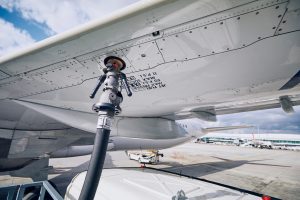Since then, a lot happened. Almost every person I know uses some voice assistant today—either an Alexa speaker, Siri from Apple, or Google products. Initially only used as an AM/FM device, voice assistants are slowly but surely becoming an integral part of many people’s life.
Listening to the latest news, ordering something to eat, getting a taxi, or placing a grocery order are just a few examples of how voice assistants are already used. And, since we’re at the very start of this innovation, voice assistants will take over more and more daily routines in the coming years.
THE RISE OF AN EXCITING NEW ERA
I’m totally convinced that we are witnessing the rise of an entirely new and exciting era. Comparable to the early days of smartphones and the first iPhone.
Nevertheless, many people doubt that Alexa, Siri, or Google will play a dominant role in the future comparable to smartphones today. However, there’s one essential reason why I’m so convinced that voice assistants will conquer our daily life: Convenience!
People value convenience above everything else. And voice assistants easily outperform smartphones when it comes to comfort. You don’t have to get your smartphone out of your pocket and waste time typing and reading. Instead, you talk and listen — most likely, while doing many other things in parallel.
ADAPTING THIS INNOVATION TO AIRLINES — OR: YOUR DATA GET A VOICE.
Why I’m telling you all this? My fascination with voice assistants and especially the future role of this innovation in our life has steadily increased. So I started to make up my mind if and how this innovation will influence the world of airline data, information, and KPIs.
Today, after many discussions with airline and tech industry people, I genuinely believe that there’s no way around voice assistants. And the reason is identic with the usage in our private lives: It’s all about convenience.
Here are three stages I can envision (from today’s point-of-view) how voice assistants will change how you work with airline KPIs.
STAGE 1 — GETTING YOUR BASIC KPIs
Let’s start this journey step-by-step. Similar to the rise at home, we will see very basic functions first. At the first stage, you won’t take a look at your smartphone anymore (at least in many situations), but ask: Alexa, how’s the current on-time performance? Or ask Siri for the number of today’s flights, the number of misconnex passengers, or the top delay reasons.
Indeed, you can check these figures already today. So these won’t be an added value in terms of information. However, as previously mentioned, it’ll be much more convenient to ask instead of checking the numbers on your mobile or laptop.
You will do that while having the first coffee in the morning, writing an email, or getting ready for the next meeting.
STAGE 2 — WHERE THE REAL INNOVATION STARTS FOR AIRLINES
With the evolving skills of voice assistants, fundamental questions will quickly turn into conversations. Besides an immense level of convenience, conversations will contribute to providing enhanced information.
Imagine the following chat:
- You: Alexa, how’s today’s on-time performance?
- Alexa: Your airline’s OTP today is 77.5%
- You: How’s that compared to yesterday?
- Alexa: Compared to yesterday’s the OTP dropped by 8.6%
- You: What are the reasons for the worse performance?
- Alexa: Weather delay reason rose by 1840 minutes
- You: How many flights have been affected?
- Alexa: 37 flights had a delayed departure due to weather
- …and so on
Of course, this is just an example. Nonetheless, it demonstrates the massive potential voice assistants hold. And by the way, you get all this information while eating, drinking, or working simultaneously.
Again, with this second stage, no information couldn’t be retrieved without using voice assistants. But efficiency is the killer here. Imagine how long it takes you today to get the data from the example above? Depending on your position, I’d guess something around 30 minutes and a few days. The conversation above probably takes 2 minutes.
And this is just one example. I always like to call this 2nd stage “Analytics on the Go.” You’re analyzing your operations, your airline’s performance without Excel sheets, Tableau reports, or support from IT guys — simply by asking your voice assistant.
STAGE 3 — CREATING NEW INSIGHTS TO DRIVE AIRLINES’ PERFORMANCE
I can’t imagine all potential use cases voice assistants are going to enable. However, compared to today’s possibilities, stage three holds an unmatchable potential for insights and efficiency.
So what’s stage three about? It’s just the next natural evolvement. Instead of asking essential questions, you will be able to go for more sophisticated things. Questions that include more variables or operations.
Here are two examples:
- Hey Siri, how’s the seat load factor of today’s North America flights compared to the year-to-day average?
- Hey Google, looking at the Airbus fleet, which delay reasons show the highest increase compared to last year
Of course, such sophisticated questions can end in a conversation similar to stage 2 to get even more insights.
Stage three holds enormous potential — for efficiency, insights, and convenience. Unfortunately, getting answers to such questions today requires time and skilled resources.
And here’s the fun part: Since such insights are no longer difficult to get, but one only question away — people will start to ask more. What does that mean? People will gain more information and more insights. And subsequently, this will contribute to improved operations.
HOW LONG DO AIRLINES HAVE TO WAIT TO SEE THIS INNOVATION REALIZED?
Now the question is, when are the above stages turning from an idea into reality. This, of course, depends on the “level of sophistication.”
As described in stage one, simple questions aren’t a big thing, and this will be available pretty soon — probably within 12 months. And based on that, I’m convinced that stages two and three are realized within 3-5 years.
We’ve already started to explore this field with our products, and we will keep you posted on the progress.
SUMMARIZED — NO WAY AROUND VOICE ASSISTANTS WHEN IT COMES TO AIRLINE KPIs
With voice assistants, you will be able to explore your airline KPIs and your entire operational information. Compared to today’s possibilities getting information, details, and analysis will be much more comfortable — driven by efficiency and convenience.
WHAT DO YOU THINK?
Always happy to get your feedback and thoughts. Just hit me up on Twitter or get in touch on LinkedIn.





